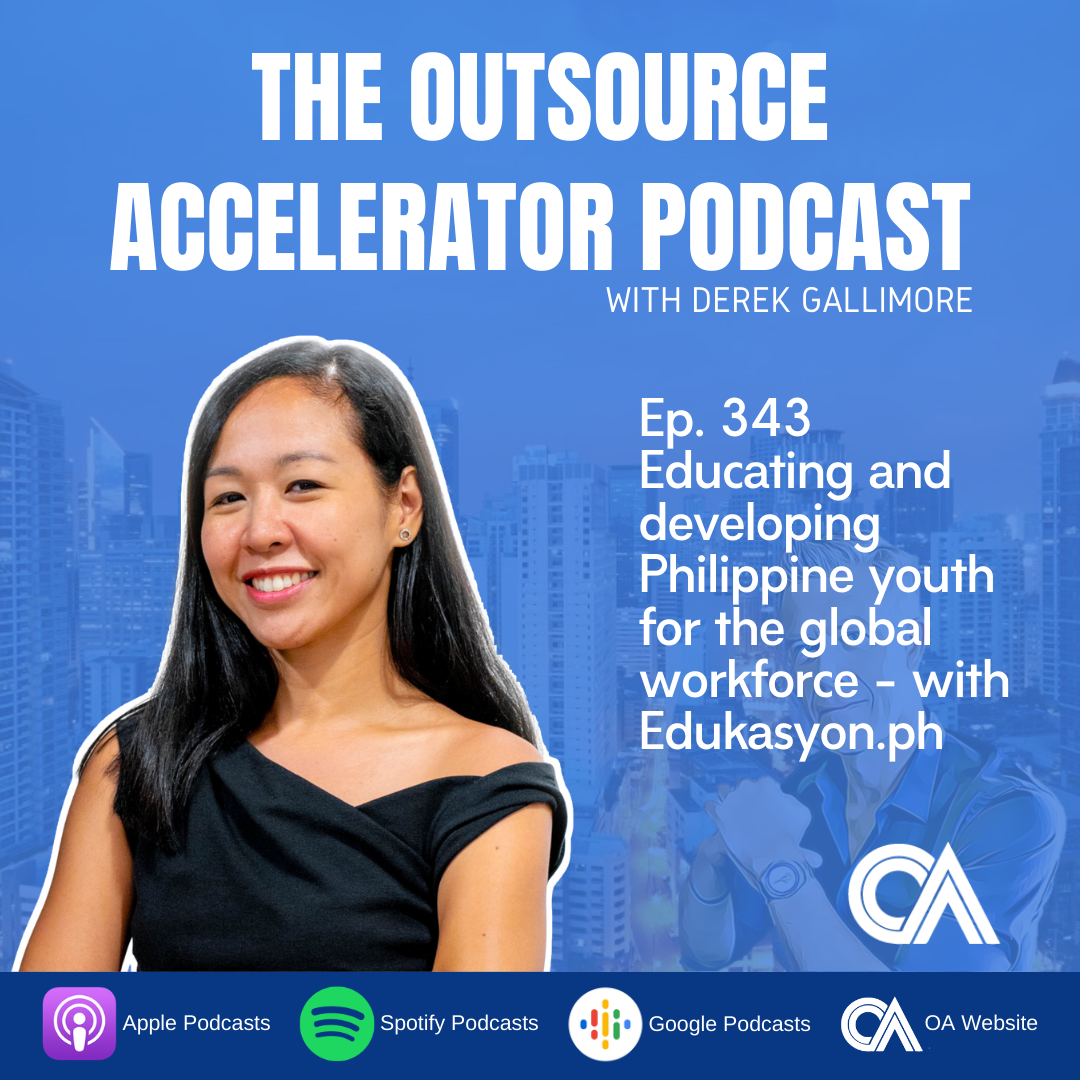Educating and developing Philippine youth for the global workforce – with Edukasyon.ph

Edukasyon.ph
Derek Gallimore interviews Grace David, current CEO of Edukasyon.ph. Founded in 2015, Edukasyon guides Filipino youth in finding the right education and career path according to their strengths and passion.
In this episode, Derek and Grace will tackle the education system in the Philippines and how it hones the youth into being workplace-ready. They will cover discussions in the educational climate, the available learning modes for students, and helping them get the career they want.
Grace David’s journey with Edukasyon.ph
Grace David is the current CEO of Edukasyon.ph, an education portal intended to help Filipino youth find better education. Edukasyon.ph focuses on providing an informed decision-making process for the Filipino youth from education to employment.
She considers herself as “raised and trained in the corporate world”, doing brand management, marketing, and sales for fast-moving consumer goods (FMCG) companies.
Grace has always been passionate about education. She spends her weekends doing volunteer teaching work. According to her, it’s a usual notion that education is “a vocation”, which is not always financially rewarding. With this, she made a conscious decision to save enough money to jump into the education sphere.
She was exposed to social entrepreneurship in one of her international assignments in Jakarta and met Henry Motte-Muñoz, founder of Edukasyon. Grace found footing in the organization from their initial conversation, realizing that her skill set is “exactly the same [skill set] required [to] be effective in serving the education sector.
Social entrepreneurship: Combining business and advocacy
Grace’s exposure to social entrepreneurship and Edukasyon makes her thankful for being able to “intersect [your] vocation and career [and] be one the same role.”
Plus, the fact that a social enterprise could exist.
The concept of social entrepreneurship usually raises questions to some, especially in terms of balancing profit and advocacy. To Grace, social enterprise is more than building a business. Rather, it is a matter of whether the business will be a true answer to a societal problem.
This rings true since compared to a conventional business, social enterprises address the idea of doing good to society and gaining profit at the same time.
Another thing she addresses is the notion of profit in education. Most people expect the education sphere to involve more in charity and volunteer work.
Grace agrees with this. However, she iterates that “we’re limiting the available resources” in running with limited funding and pure charity work.
In the end, Grace shares the concept of social entrepreneurship as being sustainable by earning profit to create a continuous cycle of support for the people.
The Philippine education system at a glance
In terms of basic education
Edukasyon pushes to create awareness of diversity towards the mode of learning for Filipinos. When it comes to education, most people automatically think of the rate of enrolled students. However, per Grace, not everyone gets to enroll in a public or private school.
The organization projected that there will be around 21 million youth ages 15 to 24 in the country by 2025. Out of the 21 million, only 6.5 million (30%) will be enrolled in a formal school. Thus, the organization focuses on making sure that the 6.5 million will graduate.
For the bigger chunk without formal enrollment, the organization sees an opportunity in uplifting non-formal schooling. One thing the Edukasyon.ph CEO points out is the availability of technical-vocational courses and the technology tools that make MOOCs and online courses available for them.
In terms of college degrees
Grace said that there’s a “good level and supply” of college education in the country. There are established universities and availability of college degrees, the reason Filipinos have good options between public and private schools.
However, only less than half of first-year students get to graduate and complete an entire course. The country bears the same trend as the United States. This is why they aim to make sure that the students get to finish their entire learning journey and help more students to graduate.
One challenge to resolve is having more seats available to more students and pushing boundaries and culture to rethink that some courses “should not be exclusive to a few [people].”
The English education in the country, especially at the tertiary level, is also abundant. Per Grace, most public and private universities use English as a mode of teaching in almost all subjects. This is great since students will have better comprehension and comfort in understanding the language.
This, as well, prepares them for a global world.

Edukasyon’s purpose in changing the sphere
In unemployment
Per Grace, a lot of work still needs to be done in the education space. There’s still a disparity in the outlook on mass education and unemployment.
Others would think English literacy is declining in terms of scores while some thought it’s improving in terms of the supply and demand in the outsourcing industry.
However, she mentioned that the unemployment in the country right now is still high, more so with the pandemic going on. One aspect to look at is the difficulty in recruitment.
According to Grace, as much as there are a lot of unemployed people, recruiters also find it difficult to hire people. This is due to the lack of qualified talents. This creates an imbalance between the supply and demand in employment.
Thus, the issue bounces back to the education sphere in the country.
In education
The organization offers its services to K to 12 students, particularly junior and senior high school students. They are involved in creating career and education awareness on what is available in the market.
Before jumping into Edukasyon, Grace thought it was enough for the youth to be enrolled, be in school, and get a diploma to be set for life. But upon knowing the statistics, she realized that only half of diploma holders get to land a job.
With this, she highlighted the need to rethink the educational journey for Filipino youth and address related issues such as:
- Self-fulfillment. To her, it’s not just enough for the youth to get a diploma and land a job. They should also be able to land a job in line with their passion and learn from it.
- Economic contribution. Most parents and students tend to gravitate towards the degrees with the fastest success. However, Grace emphasized that the economy should have a diverse set of workers to contribute to society depending on their preferred field.
Edukasyon utilizes assessment tests for students to get to know their strengths and passions and get the right career path for them. In the end, Edukasyon’s purpose is all about “guiding [the] Filipino youth from education to employment.”
To learn more about Edukasyon’s advocacy and offerings, check out their website: https://www.edukasyon.ph/.
References:
Listen to more podcast episodes here:
- Is Freelancing the New Employment? With Jon Younger PhD
- Deciphering Philippine Payroll & Staff Payments with Judah Hirsch of Salarium
- Accessing Affordable Benefits & Healthcare for Freelancers, Contractors & VAs








 Independent
Independent




